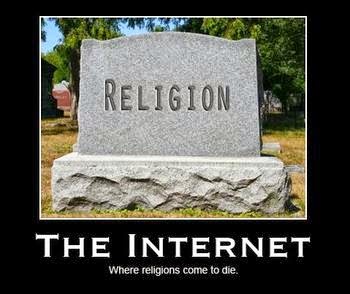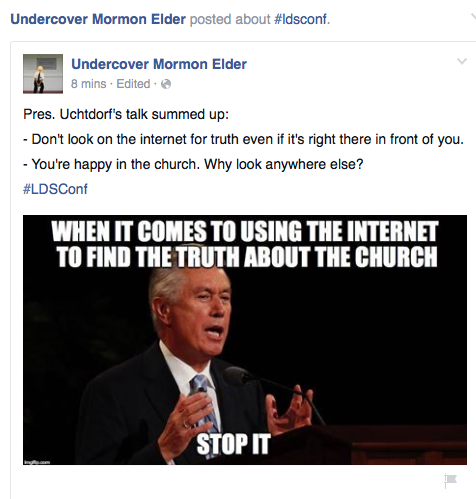Jesus Christ: “The Author and Finisher of Our Faith”
Hebrews
LDS manual: here
Purpose
To point out the lies and selective omissions of the LDS Church, and to show the danger of faith.
Reading
Today’s lesson comes from the Book of Hebrews, which the LDS lesson manual says was written by Paul…
Point out that Paul’s letter to the Hebrews contains scriptures that could be useful in each of the three situations.
…
Explain that throughout his missionary journeys, Paul sought to convince the members of the Church that they should no longer practice the law of Moses.
…
Paul wrote the epistle to the Hebrews to reemphasize that the law of Moses had been fulfilled in Christ.
… and which everyone else pretty much agrees was written by not-Paul.
The Epistle to the Hebrews of the Christian Bible is one of the New Testament books whose canonicity was disputed. Traditionally, Paul the Apostle was thought to be the author. However, since the third century this has been questioned, and the consensus among most modern scholars is that the author is unknown.
Seriously, no one has believed that Paul wrote the book of Hebrews for about 1700 years. Even at the time of the Bible’s compilation, people were saying, “Hm, this one’s a bit dodgy.” That’s why it’s in the place that it is.
Ask: Why are the Pauline epistles placed in the order that they are?
Answer: The Pauline epistles are arranged, not in chronological order as you’d expect, but in order of length. Except for Hebrews. It was placed last, just in case it wasn’t from Paul.
It’s weird that, in the church’s official materials, the scholarship is so far out of date. This should tell us a couple of things:
- Mormons say they care about the Bible, but not enough to actually find out or teach about it
- The LDS Church has a very low tolerance for any story but the simple, official story. There’s no room for any nuance or complexity.
The epistle to the Hebrews is one of the less offensive books of the Bible. It’s largely taken up by stories of how wonderful faith is — faith is actually a pernicious form of fact avoidance — and how the new Christian covenant is much better than the old Jewish covenant.
Main ideas for this lesson
Milk before meat
When I was a young missionary, one of my fellow elders told a group of us about a baptism he was participating in. He and the convert were seated in the chapel before the baptism, wearing white. The convert glanced at the missionary’s leg, and noticed the outline of his garment bottom, visible through his semi-transparent white pants. “What’s that?” he asked.
“Oh, just a lining,” replied the missionary. Everyone thought that was pretty funny. No one seemed to ponder the wisdom of withholding the information about garments to someone who, all going well, would find out about them himself within the year.
But that was the way it was as a missionary. We commonly withheld information about the church from investigators if it was uncomfortable or embarrassing. And why wouldn’t we? We had information withheld from us about the temple endowment, about church history, and so on. One of the hallmarks of the LDS Church is its ability to dispense information at the levels that it chooses.
And the justification for withholding this information comes from Hebrews, which is where we find this passage about “milk before meat”.
Hebrews 5:12 For when for the time ye ought to be teachers, ye have need that one teach you again which be the first principles of the oracles of God; and are become such as have need of milk, and not of strong meat.
5:13 For every one that useth milk is unskilful in the word of righteousness: for he is a babe.
5:14 But strong meat belongeth to them that are of full age, even those who by reason of use have their senses exercised to discern both good and evil.
In the LDS Church, the phrase “milk before meat” is used as a way of justifying information control and incomplete disclosure. This is a form of lying by omission. I suppose that — just as my missionary friend hoped that by the time his convert learned about garments, he’d be too invested to quit — the church is hoping that we won’t mind the deliberate withholding of information.
Of course, in our Internet age of copious information, any organisation that maintains its control by limiting information to its members will die a very messy and public death.
Predictably, LDS leaders tell members to avoid looking at the Internet.
His actual quote:
After a recent medical procedure, my very capable doctors explained what I needed to do to heal properly. But first I had to relearn something about myself I should have known for a long time: as a patient, I’m not very patient.
Consequently I decided to expedite the healing process by undertaking my own Internet search. I suppose I expected to discover truth of which my doctors were unaware or had tried to keep from me.
It took me a little while before I realized the irony of what I was doing. Of course, researching things for ourselves is not a bad idea. But I was disregarding truth I could rely on and instead found myself being drawn to the often-outlandish claims of Internet lore.
This “avoid the Internet” strategy is not unique to Mormons. Here’s a clip of Anthony Morris III, a member of the Governing Body of Jehovah’s Witnesses.
… and be careful on the Internet. We were talking about that this weekend with friends. Oh my word, how many times do we have to tell you, be careful? You know, going here, going there, they’ll suck you in. Some of the stuff, it can seem so innocent. We’re just warning you. That’s all we can do — is admonish. Stick with what we have authorized. You’ll be safe. You wanna go out there? It’s at your spiritual risk.
Here’s an astute comment about this video:
People who are telling the truth don’t have to fear outside information.
But these leaders are doing everything they can to keep followers inside of a bubble.
It’s just rare to hear them admit it so bluntly.
Another small point: Having taught Sunday School lessons over and over, I confess that I began to wonder where the ‘meat’ was. The church curriculum seems to be all milk.
Unpardonable sin
If converts don’t stay in the church because of lack of information, they can always count on threats. Here not-Paul mentions the very vague ‘unpardonable sin’, and ties it pretty unambiguously to apostasy.
He starts with guilt…
Hebrews 6:4 For it is impossible for those who were once enlightened, and have tasted of the heavenly gift, and were made partakers of the Holy Ghost,
6:5 And have tasted the good word of God, and the powers of the world to come,
6:6 If they shall fall away, to renew them again unto repentance; seeing they crucify to themselves the Son of God afresh, and put him to an open shame.
… and moves on to fear.
Hebrews 10:26 For if we sin wilfully after that we have received the knowledge of the truth, there remaineth no more sacrifice for sins,
10:27 But a certain fearful looking for of judgment and fiery indignation, which shall devour the adversaries.
10:28 He that despised Moses’ law died without mercy under two or three witnesses:
10:29 Of how much sorer punishment, suppose ye, shall he be thought worthy, who hath trodden under foot the Son of God, and hath counted the blood of the covenant, wherewith he was sanctified, an unholy thing, and hath done despite unto the Spirit of grace?
10:30 For we know him that hath said, Vengeance belongeth unto me, I will recompense, saith the Lord. And again, The Lord shall judge his people.
10:31 It is a fearful thing to fall into the hands of the living God.
Ask: What does not-Paul threaten us with if we stop believing?
Answer: Fire and devourment.
This tactic is known as the argumentum ad baculum, or “argument from the cudgel“. The church uses it in a slightly more subtle manner than not-Paul. Here’s a copy of the first letter you get when you try to resign from the church:
This is a threat. The church is threatening you with eternal consequences if you leave. Myself, I do not like being threatened.
One member tried to explain to me (rather unconvincingly) that it wasn’t a threat — it was just a simple statement of a fact… about what his invisible pal was going to do to me if I didn’t get my ass in line. Yeah, no, still a threat.
Faith and evidence
When I ask religious people for evidence of their god’s existence, they sometimes bust out this scripture:
Hebrews 11:1 Now faith is the substance of things hoped for, the evidence of things not seen.
…Yeeees, I suppose that scripture has the word ‘evidence’ in it, but this doesn’t mean that faith is a kind of evidence. In fact, it’s quite the opposite. Check out this quote from Matt Dillahunty (at 24:17).
“Faith is the excuse people give for believing something when they don’t have a good reason. ‘Cause if you have a good reason, you don’t need faith.”
So faith is the “evidence of things not seen”? Of course! Because once you’ve seen, you’ve got evidence.
It gets even better: check out this list of murders that were made possible by faith. By faith, children were (allegedly) killed…
Hebrews 11:27 By faith he forsook Egypt, not fearing the wrath of the king: for he endured, as seeing him who is invisible.
11:28 Through faith he kept the passover, and the sprinkling of blood, lest he that destroyed the firstborn should touch them.
…Egyptians were (allegedly) drowned
11:29 By faith they passed through the Red sea as by dry land: which the Egyptians assaying to do were drowned.
…cities slain…
11:30 By faith the walls of Jericho fell down, after they were compassed about seven days.
11:31 By faith the harlot Rahab perished not with them that believed not, when she had received the spies with peace.
11:32 And what shall I more say? for the time would fail me to tell of Gideon, and of Barak, and of Samson, and of Jephthah; of David also, and Samuel, and of the prophets:
11:33 Who through faith subdued kingdoms, wrought righteousness, obtained promises, stopped the mouths of lions.
Remember Jephthah? Killed his daughter as a sacrifice to Jehovah / Jesus. You’d think not-Paul would be embarrassed about this, but here he specifically name-checks Jephthah as a righteous man who did mighty deeds by his faith.
All of which should be enough to tell us that faith is a terrible thing. It’s a broken compass that points any which way you want it to. You can believe anything — and perform any atrocity — with faith.
Additional lesson ideas
“Whom the Lord loveth he chasteneth”
You might think that, if you do good things, you get good things. But this doesn’t always work out, mostly because God is imaginary. But this explanation isn’t available to not-Paul, so what does he come up with?
Hebrews 12:6 For whom the Lord loveth he chasteneth, and scourgeth every son whom he receiveth.
12:7 If ye endure chastening, God dealeth with you as with sons; for what son is he whom the father chasteneth not?
That’s right — God will “chasten” you, because he loves you so much. I suppose it’s a plausible explanation, but it does make God into kind of an abusive psychopath. Ah, well — this is a common theme in our lessons.
Until next week.



Recent Comments